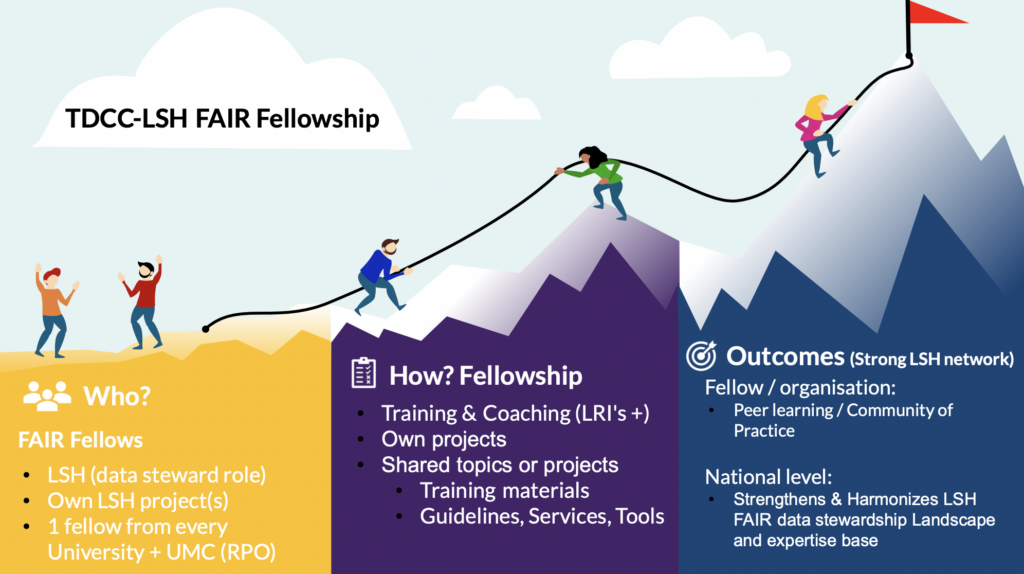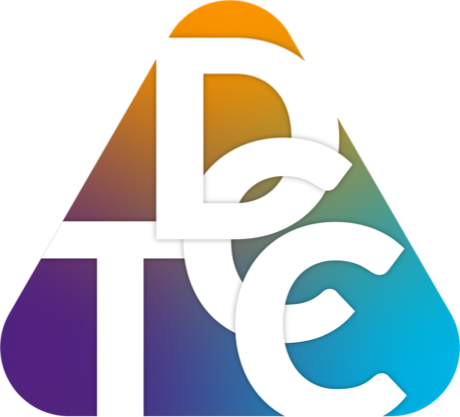TDCC-LSH Project initiatives
TDCC-LSH has two types of project strands to support collaborative projects in the Life Sciences and Health domain.
Bottleneck project
The bottleneck project is a one-off investment of €950,000 by NWO to tackle challenges described in the TDCC-LSH roadmap.
Challenge projects
Challenge projects are mid-sized projects with a duration of 24 – 30 months and a budget between €50,000 – €400,000. There will be several calls for projects and the first call for these projects launched in 2023-2024 with an initial sum of €1,6 million per TDCC domain. TDCC-LSH has two rounds of funding opportunities in 2023-2024, with the first deadline being 8th of January 2024 and the second deadline at 5th of April 2024 to submit an expression of interest. Afterwards projects go through a transparent, collaborative and community led review process before receiving a submission letter, which focuses on connecting initiatives to strengthen project applications and prevent fragmentation of project funding.
*If you are interested in one of these projects, would like to join the initiatives or want to launch a new initiative: please contact the TDCC-LSH through celia.vangelder@health-ri.nl (Network manager), kimberley.zwiers@health-ri.nl (Community Coordinator Life Science) or fieke.schoots@health-ri.nl (Community Coordinator Health).
Bottleneck Project: Strengthening the Dutch LSH FAIR data stewardship landscape – installing a national cohort of FAIR LSH fellows
Facilitating and harmonizing community-driven initiatives is an essential element of professionalizing data driven health and life sciences. Fostering collaborative relationships and strengthening the connection between various national and international initiatives, such as large-scale research infrastructures, research consortia and data supporting organizations, is a crucial step to advance the life sciences & health data infrastructure in the Netherlands.
A national cohort of FAIR fellows is proposed to tackle the prioritized bottleneck challenges that have been identified by the LSH community in the period 2021-2022 and have been described in the LSH roadmap. These bottlenecks are related to 1) network building, 2) tools, resources & guidelines and 3) skill building. In this first cohort of fellows, all RPOs (i.e. Universities & UMC's) in the Netherlands will be eligible to put forward one fellow. The fellows will bring in their expertise in life sciences and/or health data handling. They will work simultaneously on advancing their own skills (with the commitment to bring this expertise to their own organisation) as well as working in a national context to tackle common challenges. The fellows will be guided by a team of expert coaches and supported by a dedicated training & capacity building programme.
Main Objectives
1) Enhancing digital competencies across Dutch Health & Life sciences by skill building in FAIR data stewardship in the RPOs in the Netherlands.
2) Collaboratively develop solutions and resources related to FAIR implementation in the LSH domain in the Netherland.
3) Increase cross-domain collaboration in FAIR implementation in the LSH domain by expanding and strengthening the network of FAIR LSH experts.
*This bottleneck project is currently still under development and to be submitted under the TDCC bottleneck projects. Once finalised and approved, more information will become available.
Below you will find an overview of currently submitted challenge project initiatives in different stages of development. If you want to know more or get involved, please contact TDCC-LSH Network of Community Coordinators.
First round of pre-proposals (deadline 19th of February)
BASELINE: A Free, Open-Source Solution to Track Informed Consent and Opt-Outs - by Erasmus MC, LUMC.
A regional health data platform as the secure backbone for general practitioners and hospitals to provide primary and pseudonymized secondary use of health data - by MUMC+, Health-RI, TEC
A national FAIR Expert Team for local capacity building - by RUMC, LUMC, AUMC, anDREa
ABCDE: Aligned Biodiversity Community on Data & eScience - by Naturalis Biodiversity Center, Nederlands Instituut voor Ecologie, Westerdijk Fungal Biodiversity Institute, Data Archiving and Networked Services, Coöperatie SURF, Netherlands eScience Center
A FAIR tool framework for bioinformatics services, tools and workflows in digital Life Sciences and Health (LSH) research - by UM, Prinses Máxima Centrum, LUMC, UMCG, VU, Amsterdam UMC, eScience center, SURF, Health-RI.
LEARN-FAIR: Life Science & Health Educational Alignment for Research and Networking in FAIR Data Management - by Amsterdam UMC, Health-RI, Leiden University Medical Center, Maastricht University, Radboudumc
Galaxy2K - 1000 students and 1000 researchers empowered by Galaxy to tackle digital and FAIR challenges - by LUMC, Erasmus MC, SURF, WUR, UMC Utrecht, Naturalis, Avans Hogeschool, Hogeschool Leiden, Hanze Hogeschool, RadboudUMC, AmsterdamUMC, Westerdijk Institute, Antonius Ziekenhuis
Training the next generation of FAIR-aware and AI-savvy data scientists for the LSH domain - by Amsterdam UMC, WUR, TUe, VU, Health-RI/BioSB
Second round of projects (deadline 5th of April)
T.B.A
The Dutch Research Council (NWO) has opened the first TDCC project call from *November 15, 2023 until November 15, 2024 at 14:00:00 CET to further support the TDCC network and support the digitalization of science as a whole. The TDCC-LSH is building on the working relationships and collaborations it has established with various stakeholders in the health and life sciences domain and aims to utilize the TDCC-LSH network to develop community-driven projects. In most cases, this is not about developing new scientific knowledge, but about finding and disseminating the right knowledge, and agreeing on its joint application. The projects resulting from this call will therefore focus mainly on support and networking. Applicants can apply for a minimum total of €50,000 and a maximum of €400,000 for project proposals with a maximum duration of 24 months. This TDCC call differs from other NWO open calls, due to the fact that a submission letter from the responsible TDCC domain is required before one can apply for project funding at the Dutch Research Council (NWO). More information on how to obtain the submission letter for TDCC-LSH can be found below.
The TDCC-LSH asks all members of the LSH research community to submit community-driven project ideas!
Once new project ideas are submitted to TDCC-LSH, the TDCC-LSH team will explore similar projects and provide matchmaking opportunities that hopefully result in stronger community-driven projects. As a first step, we ask interested applicants to share their project idea via a short Expression of Interest statement. The complete process is set-up in such a way that successful ideas will gradually require more time investment from the applicants, that proposals are co-developed from the start and are finalized at the end of the process and can be directly submitted to NWO.
*The TDCC-LSH will conduct two project rounds in 2023-2024, each with their own project deadlines: The first deadline for submitting an expression of interest for Round one is 8th of Jan 2024; and the second deadline for Round 2 is 5th of Apr 2024.
For more information about the process itself, please click the button below.
Submit a new TDCC-LSH project idea
